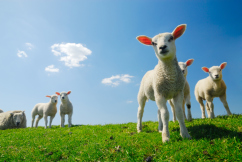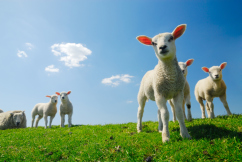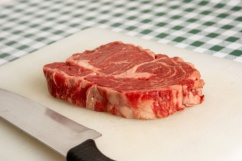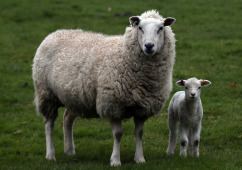Meat Trade News
Lamb prices are beginning to pick up after declining over recent months, but they still remain lower than last year, according to Quality Meat Scotland (QMS).
Stuart Ashworth, head of economics at QMS, said lamb prices had picked up over the past fortnight to stand at 150p/kg lightweight, an increase on 143p/kg three weeks ago. However, Ashworth noted that this was still 10% lower than last year’s prices.

Ashworth attributed low prices to an increase in supply and carcase weights, with UK abattoirs slaughtering 6.5% more sheep than last year. “The challenge for producers is to manage the orderly delivery of this increased supply onto the market within customer specification.
“Earlier this year there has been a higher than normal proportion of lambs exceeding the standard quality quotation upper weight limit of 45.5kg liveweight,” Ashworth added.
He was confident that the increased lamb numbers would supply export markets where lamb supply was tighter – for instance France and Spain. However, this has met with difficulty over exchange rates as sterling remains strong against the euro, which is “more challenging” for Scottish and UK lamb exporters.
“Adding to this export pressure is weak consumer demand in Europe,” said Ashworth.
“France has seen the consumption of lamb decline by almost 7% during July, although the country’s domestic production fell by 3%. Over the longer period of January to July, however, consumption has increased slightly.”
The Bakers’ and Butchers’ Autumn Fair 2014 saw butchers and exhibitors from across the country gather for a day of networking and competition.
Held in Newark, Nottinghamshire, the fair hosted the National Pie Competition and the Champion of Champions sausage competition. Craig Finch from Craig Finch Butchers was crowned sausage champion for the second consecutive year. Meanwhile, Pork Pie of the Year went to Simon Haigh, Bolster Moor Farm Shop; Savoury Pie of the Year to Simon Haigh, Bolster Moor Farm Shop; Steak and Kidney Pie of the Year was awarded to Trevor Fairburn, Trevor Fairburn Butchers; and finally Pasty of the Year went to Robert Bowring, R Bowring Farmers & Butchers.
Television presenter Keith Chegwin presented the winners with their trophies while providing some light entertainment for visitors. Chegwin told Meat Trades Journal the competitions were a great way to celebrate the industry. Talking about his local butcher, Chegwin said: “I am not a real fan of the supermarket cuts, which is awful to say, they might advertise reasonable steak or what have you, but it’s just reasonable – it’s not very good. But if you find a good butcher, they can give you good advice.”

Throughout the day the centre stage, sponsored by the Dalesman Group, who also presented a demonstration on its new range of sauces, played host to a range of talks about how to make the most out of your butchery business, including: Sam Flynn, The Social Media Success Maker; Matthew Southam, Eblex & Stefan Porter, Market Porter, on the benefits of trading online; Stephen Hallam, Dickinson & Morris on What is an authentic Melton Mowbray pork pie?; and Steve Derrick from Lucas Ingredients on how to get profit from pork pies using Lucas’ ingredients.
Ed Bedington, editor of MTJ, which co-organised the event with sister title British Baker, hailed the day a success and looked forward to next year: “The Butchers’ and Bakers’ Fair is always a popular attraction and this autumn’s event proved no different. There was a great mix of speakers, exhibitors and competitions, which drew butchers from far and wide.
“We were delighted with the attendance and the interaction across the trade and I think a great day was had by all. We now look forward to organising next year’s event, which we will aim to make bigger and better yet, building on the success of the Newark show.”
The UK sheep trade is set to remain under pressure into the new year due to various reasons, according to Eblex.
The organisation said a combination of subdued demand, plentiful supply and an increase in the number of out-of-spec animals being marketed are likely to see prices continue to struggle.

Defra statistics suggest that the kill level is only up by 1% this August year on year. However, average carcase weights are up 2% while lamb numbers for September are estimated to be up 3% year on year.
The Muslim festival of Eid-al-Adha, which falls on 3 October, may provide some short-term relief for prices, and a significant uplift is already being seen this week. However, Eblex sector director Nick Allen said supplies are likely to remain high into next year: “There is always a seasonal drop in price as we hit peak supply levels for the market for sheep meat in October, but there are a number of factors at play, which mean, this year, numbers are higher and they are coming onto the market sooner.
“There is no question that supply is outstripping demand at the moment, not just here but on export markets too. France, for instance, is our most important export market for sheep meat and they are struggling with a poor economic situation. The strengthening of sterling against the euro has done no favours for the trade in this region.”
The environment secretary has announced that the number of people employed in the food and drink industry rose by 71,000 between 2013 and 2014.
The figures come from the latest government Food Statistics Pocketbook and show the rise in employment in the sector from the beginning of 2013 to the same time this year. The number of people working in food and drink now accounts for 13% of national employment, totalling at more than 3.6 million.

Environment secretary Elizabeth Truss said: “Britain’s food industry is an economic powerhouse driving growth and jobs. We want more people to buy British both at home and abroad.”
The statistics also revealed other positive news. The total value of food and drink exports is rising, worth £6 billion more than in 2005, currently standing at £18.9 billion. Furthermore, they showed that the value of agriculture to the economy increased by 7% between 2012 and 2013
Truss added: “We have some brilliant success stories like Step Farm in Oxford, part of an organic dairy co-op that sold a staggering 40 million pints of cheese, milk and cream to America and Europe last year, or Suma in Yorkshire who sell our organic veg to Hong Kong. We want to see more businesses like this striking deals and trading our high quality produce abroad.”
Defra said that the government was working hard to enable the food and farming industry to compete with the rest of the world. It gave examples such as cracking down on food fraud, making it easier for government departments, schools and hospitals to buy local produce, and helping businesses strike lucrative deals abroad by removing barriers to trade and opening up new markets.
The National Farmers’ Union (NFU) is encouraging producers to take to social media to bring retailers who are promoting out-of-season foreign lamb into light.

NFU livestock board chairman said British lamb should be given “pride of place” on supermarket shelves and is urging people to Tweet pictures of supermarkets failing to do so to @NFUtweets using the hashtag #BackBritishFarming.
Sercombe said: “I believe I speak for all livestock farmers when I say that I am bitterly disappointed to see that, at a time of year when there is an ample supply of fresh, tender and delicious new-season lamb available, some retailers are failing to live up to their commitments to support British farming.
“This year has seen an excellent growing season for lamb, and you would think that this would be reflected on the shelves. Instead, as the photos we have been receiving from members show, facings are still failing to promote this fantastic meat at the peak time of year. The strength of feeling farmers have on this was shown at the Royal Welsh this summer.”
Some retailers, namely Tesco, have already come under fire on Twitter for not supporting British lamb, instead choosing to promote New Zealand products